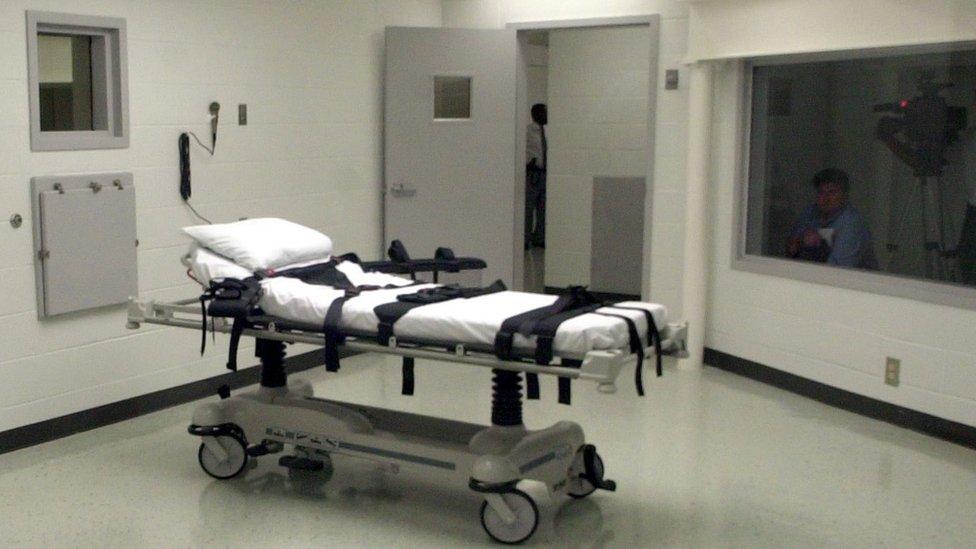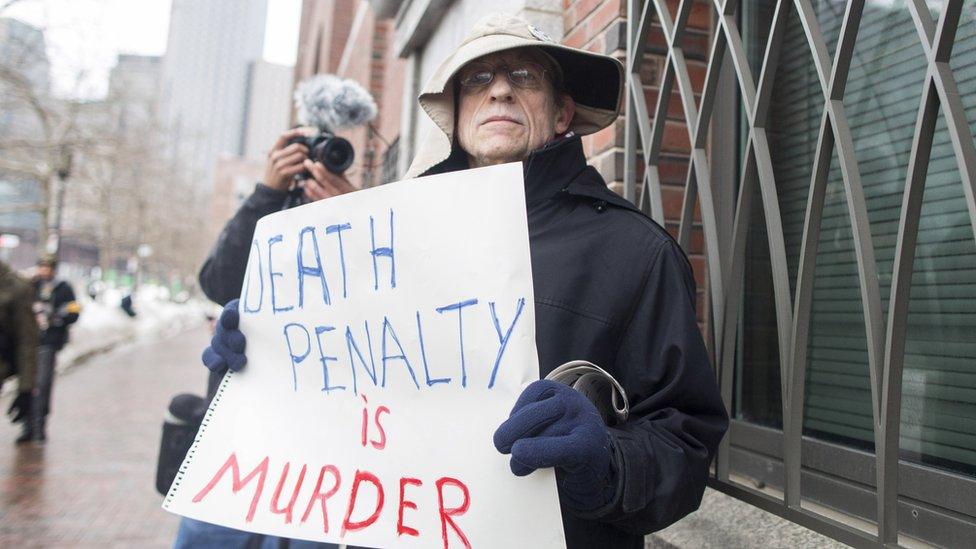US capital punishment fall to 40-year low in 2016
- Published

Fewer death sentences were handed down in the US this year than at any time in the last four decades, a study finds.
Only 30 such penalties were imposed in 2016, the lowest since the US Supreme Court reinstated capital punishment in 1976 after a four-year hiatus.
Five states, Georgia, Texas, Alabama, Florida and Missouri, carried out 20 executions.
It continues a 20-year downward trend in US capital punishment, says the Death Penalty Information Center.
The new DPIC report, external showed that not only have executions slowed or even halted in the vast majority of states, but juries and judges are sentencing fewer people to death.
"This year, death sentences will be lower than at any other time in the modern history of the American death penalty," says Robert Dunham, executive director of the DPIC and lead author of the study. "That, I think, is a big story."
After the US death penalty was reinstated 40 years ago, the number of death sentences and executions began steadily rising.
In 1977, 137 death sentences were handed down.
The trend peaked in the 1990s, with 98 executions in 1999 and 315 new death sentences in 1996.
Then the downward trend began.
In 2016, only 30 new death sentences were handed down, and 20 executions took place.
That was the fewest number of executions since 1991.
Of the five states that put inmates to death in 2016, Georgia led the way with nine executions, followed by Texas with seven, Alabama with two, and both Florida and Missouri executed one person.
New death sentences are down 37% from 2015, according to the report, and fewer death sentences were imposed in 2016 "than in any other year since the Supreme Court declared US death penalty statutes unconstitutional in... 1972".
Mr Dunham points out that the low number of new death sentences was notable as well.
Georgia, for example, sentenced no-one to death in 2016.
"Texas had four new death sentences, which is very low for the state," he said.
"Dallas and Harris counties, which is where Houston and Dallas are, imposed no new death sentences for only the second time since the 1980s."
The halt of executions in some states can be explained by the difficulty procuring legally acceptable drugs needed for lethal injections in the US.
Many pharmaceutical companies refuse to provide them, and the European Union banned the export of the drugs to the US in 2011.
Some states have resorted to clandestine deals with compounding pharmacies or different drug cocktails, and a series of botched executions in recent years has raised legal and ethical concerns about these practices.
Legal challenges that can take decades to resolve and exonerations around the country have also slowed executions.
So far there have been 156 men and women exonerated from death row in the US.
"Lawyers cost an awful lot more than prison guards, and there is just enough ambivalence for state killing as a criminal punishment to make the due process standard higher than for other kinds of punishment," says Frank Zimring, a death penalty expert and professor at the University of California-Berkeley School of Law.
"The combination of high expense and low assurance has sort of taken the enthusiasm out."
According to various polls, American opinions are roughly split when it comes to the death penalty.
A Pew Research Center poll, external shows approval for the death penalty has declined from a high of 80% in the 1990s to only 49% in favour now.
However, Robert Blecker, a death penalty supporter and professor at New York Law School, says that the majority of Americans still favour the use of capital punishment.
"[Approval may be] down from an all-time high of 80%, but it's also up from the 1968 low," he says.
"California supported it, Oklahoma put it in its constitution, and Nebraska reversed its own legislature.

A demonstrator at the trial of Boston bomber Dzhokhar Tsarnaev, who was sentenced to death
"How much clearer evidence could you possibly want as to where American public opinion is?"
During this year's election season, three US states had items related to capital punishment on their ballots, and in all three states, death penalty proponents won big on election night.
Nebraskans voted to bring their death penalty back after legislators banned the practice in 2015.
Californians voted to speed up their executions rather than abolish them.
In Oklahoma, voters approved new constitutional language to protect the use of capital punishment.
Mr Zimring concedes that the general public may not necessarily approve of the precipitous decline in the use of capital punishment.
But he points out that when other nations abolished their death penalty it took some time for the general public to concur.
"When you study the western European decline of the death penalty, it turns out that public support for hanging people persists for almost 20 years after moral leadership abolishes the death penalty," he says.
"It takes a long time for public passions to catch up with the moral leadership of elites."
Although this year's figures continue to bolster the narrative that the American criminal justice system is increasingly turning away from the death penalty, the end of capital punishment may still be a long way off.
"The end game is going to be long and expensive and in a deep way, unnecessary," says Mr Zimring.
"That's billions of dollars and many too many executions in the American future."